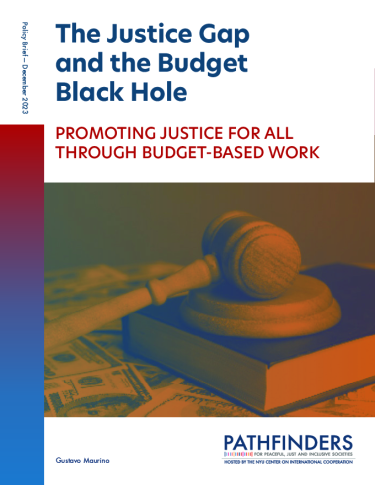The field of justice lags behind other sectors in linking fiscal and budget policies to the achievement of people-centered objectives because people assume the challenge to be primarily legal, and assessments are not often informed by fiscal costs, resources, and impact.
This policy brief looks at how access to justice for all will remain elusive unless justice experts begin to evaluate and address the fiscal dimensions of the justice gap.
In most countries, data on public and private investment in justice services is limited. Many countries do not have information on the levels of investment nor on the effectiveness of investment. Others assess only investment in traditional, formal justice institutions, which tackle just a small proportion of people’s justice problems. In the human rights and other fields, recognition has also grown in recent years that budgets are not just technical matters, but determinants of whose needs are prioritized and attended to. Budgets reflect political choices and priorities and lie at the center of democratic governance and accountability.
It is critical that the justice sector makes the case for investment in justice as a key to achieving sustainable development.
This has led to a democratization of budgetary processes, with people increasingly participating in the process— demanding greater transparency and accountability from those responsible for budget design and execution. Further, this brief looks at how results-based budgeting models and performance-oriented budgets have been the most important developments in connecting budgets to substantive social justice agendas. Justice experts can learn from successful budgeting models implemented in other areas, including human rights budgeting, gender budgeting, equality and well-being budgeting, and green budgeting.
Opening up justice budgeting and ensuring that it responds more effectively to people’s needs will require a comprehensive assessment of the social costs of unmet justice needs; the cost of services currently deployed; the potential costs of alternative interventions; and the impact of investment on the justice outcomes people need and want.
Finally, this brief examines the importance of considering not only the institutional but the functional role of justice budgets in affecting social outcomes. This will require expanding the traditional conception of what constitutes justice services beyond formal courts and lawyers; basing investment decisions on evidence of what works to meet people’s justice needs; rebalancing investment to assist hitherto neglected communities and population groups; and considering the role of other sectors and of non-state actors in promoting or denying justice.
